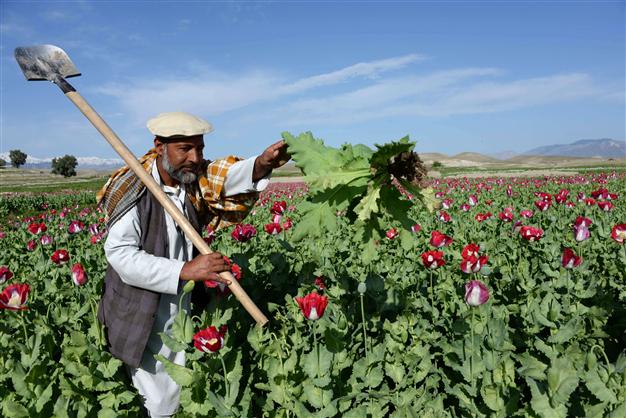AT-KABUL: The UN Office on Drugs and Crime (UNODC) welcomed the Afghan government’s new strategy to fight drugs.
Executive Director of the UNODC, Yury Fedotov, said that Afghanistan continues to be the major producer of opiates in the world, posing grave challenges to security, development and health in the country, the region and beyond.
He said that the UNODC welcomes the Brussels summit’s support for long-term and integrated approaches to reduce the illicit production and trafficking of narcotics and precursors, and fight organized crime, money laundering, corruption and the financing of terrorism, as well as advance evidence-based drug use treatment and rehabilitation services.
“UNODC is working with Afghanistan through our Country Program, and providing assistance in areas such as customs enforcement, precursor control and capacity building for the Ministry of Counter Narcotics and the Counter Narcotics Police. We also support the inter-ministerial council on the economy, as well as work on the rule of law and to counter corruption, money laundering and other economic crimes,” he said.
Yury Fedotov said that the UNODC is helping to strengthen regional and inter-regional cooperation, including through the regional program for Afghanistan and neighboring countries; the Triangular Initiative of Afghanistan, Iran and Pakistan; the AKT Initiative of Afghanistan, Kyrgyzstan, and Tajikistan; the Central Asian Regional Information and Coordination Centre; and the Gulf Cooperation Council – Criminal Information Centre to Combat Drugs.
“UNODC’s Networking the networks initiative is supporting operational links between such regional structures on all major Afghan opiate trafficking routes, including the Balkan route. Furthermore, we remain engaged in supporting the Paris Pact Initiative to fight illicit drugs flowing from Afghanistan.
The annual Afghan opium survey will be released later this month,” he said.
Regarding the production level of the opiates, Yury Fedotov said that preliminary results suggest that illicit cultivation has increased well above two hundred thousand hectares, with an expansion in the northern and western provinces of the country.
“Eradication has been close to zero. The production of opiates is expected to follow the same upward trend. Clearly we cannot afford to see international community engagement in Afghanistan weaken. We need long-term resources, strengthened regional cooperation and the strong political commitment and continued engagement of the Afghan government and international community,” he said.
According to the UNODC, Afghan heroin is brought to people who use drugs worldwide via three broad trafficking routes out of Afghanistan: the Balkan route, the northern route and the southern route.
Ministry of Counter Narcotics revised its drugs control strategy to deal with the growing production and sale of the opiates, as opium is used as a funding source by the insurgents.
Last year in December, the Criminal Justice Task Force (CJTF) acknowledged that narcotics are a funding source for terrorists.
Spokesperson of the CJTF, Ahmad Khaled Moahed, said that link between terrorism and narcotics is evident.
He said that this international phenomenon, where annually world mafias earn $60-70 billion through narcotics, so only Afghanistan will fail to deal with this phenomenon. “The international community shall help Afghan security forces for further achievements.” According to survey reports, 12.6 percent of adults in Afghanistan are drug addicts.
 Afghanistan Times
Afghanistan Times




